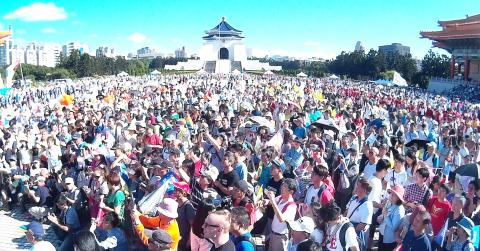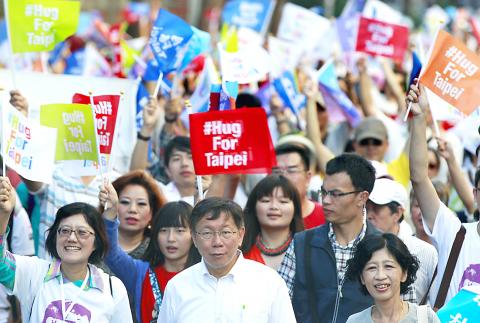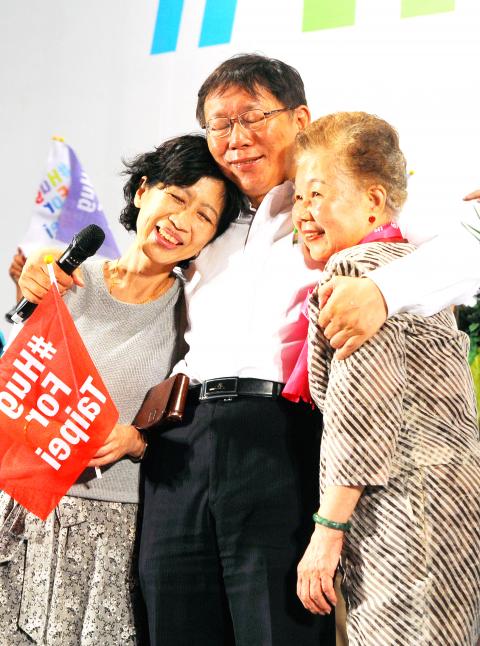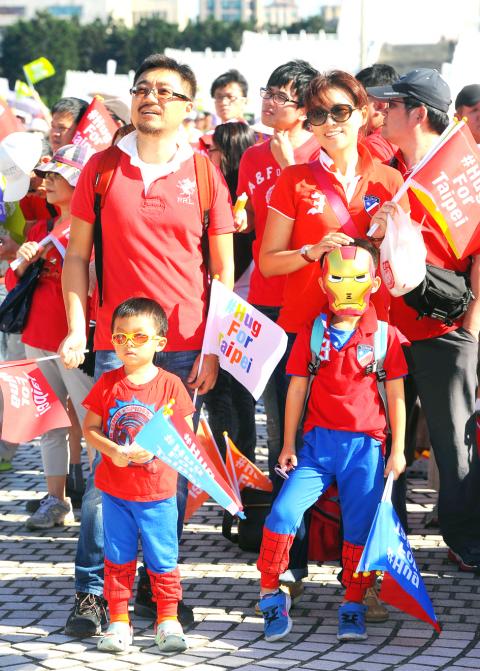More than 200,000 people, according to organizers’ estimates, took to the streets yesterday to join independent Taipei mayoral candidate Ko Wen-je (柯文哲) in a carnival-themed campaign parade, voicing their support for Ko’s “campaign for a change.”
Including samba dancers, people dressed as characters from fairy tales, giant balloons in the shape of a four-headed dragon, Mother Teresa — and the first Presbyterian missionary to northern Taiwan, George Leslie Mackay — as well as decorated floats and people holding colorful flags reading “Hug for Taipei,” thousands paraded from Liberty Square to Taipei City Hall in what appeared to be a festival celebration rather than a campaign event.
The crowd was divided into eight sections, each represented by symbolic colors: red for friendship, orange for brevity, yellow for passion, green for creativity, blue for freedom, indigo for eagerness, purple for equality and white for tolerance and dreams.

Photo: Wang Min-wei, Taipei Times
Each section was led by a float decorated with specialties and landmarks from different districts in the municipality. Although the head of the parade left Liberty Square at about 2pm, Ko, his wife and his parents, who were at the end of the parade, did not depart until 3:30pm, because the parade route was jammed.
Many marchers and onlookers cheered as Ko and his family passed by, while others were eager to point out Ko to bystanders.
Although Zhongzheng (中正) and Daan (大安) districts — where the parade passed — are considered to be Chinese Nationalist Party (KMT) strongholds, many residents waved to the parade from their windows and shouted their support.

Photo: Reuters
“I would like to thank everyone for cheerfully taking part in the parade, embracing Taipei with love, welcoming the approaching mayoral election with feelings of festivity and looking forward to realizing the change,” Ko told his supporters in front of Taipei City Hall.
“Along the parade route, I saw bright colors, creativeness, and smiles on your faces. I would like to thank you for what you did with me — we succeeded in changing the political culture in Taiwan, elections are no longer about sorrow and threats; they are bright and joyful.”
Referring to his KMT rival, Sean Lien (連勝文), who cried during his own rally on Saturday, Ko said that unlike “another person” who was in tears during another parade and made it sorrowful, “I think the objective of politics is to make people happy, not sad.”

Photo: Wang Min-wei, Taipei Times
Ko said that the parade ended at the city hall because, if he is elected, his government would be a transparent one and therefore he would “lead the people into the city hall.”
“In the past, due to differences in ideology, an invisible and cold wall had been erected in the city between you and me. The wall divided us into ‘pan-green’ and ‘pan-blue,’ pro-‘unification’ and pro-independence, nationals and imperial subjects,” Ko said. “The two sides of the wall hated each other, shouted at each other and opposed each other. We do not know when this wall appeared, or how long it has existed, but it makes our family relationships, friendships and loves suffer.”
“I am here to stand with everyone in the city, to tear down the wall with love and hugs,” he said.

Photo: Wang Min-wei, Taipei Times
Ko added that there are many challenges facing society, including an increasing wealth gap, the unequal distribution of social resources, housing injustice and injustice in education resources.
“These are all the walls we must tear down,” he said.
Police estimated that about 100,000 people attended the event.

PREPAREDNESS: Given the difficulty of importing ammunition during wartime, the Ministry of National Defense said it would prioritize ‘coproduction’ partnerships A newly formed unit of the Marine Corps tasked with land-based security operations has recently replaced its aging, domestically produced rifles with more advanced, US-made M4A1 rifles, a source said yesterday. The unnamed source familiar with the matter said the First Security Battalion of the Marine Corps’ Air Defense and Base Guard Group has replaced its older T65K2 rifles, which have been in service since the late 1980s, with the newly received M4A1s. The source did not say exactly when the upgrade took place or how many M4A1s were issued to the battalion. The confirmation came after Chinese-language media reported

A Ministry of Foreign Affairs official yesterday said that a delegation that visited China for an APEC meeting did not receive any kind of treatment that downgraded Taiwan’s sovereignty. Department of International Organizations Director-General Jonathan Sun (孫儉元) said that he and a group of ministry officials visited Shenzhen, China, to attend the APEC Informal Senior Officials’ Meeting last month. The trip went “smoothly and safely” for all Taiwanese delegates, as the Chinese side arranged the trip in accordance with long-standing practices, Sun said at the ministry’s weekly briefing. The Taiwanese group did not encounter any political suppression, he said. Sun made the remarks when

The Taiwanese passport ranked 33rd in a global listing of passports by convenience this month, rising three places from last month’s ranking, but matching its position in January last year. The Henley Passport Index, an international ranking of passports by the number of designations its holder can travel to without a visa, showed that the Taiwan passport enables holders to travel to 139 countries and territories without a visa. Singapore’s passport was ranked the most powerful with visa-free access to 192 destinations out of 227, according to the index published on Tuesday by UK-based migration investment consultancy firm Henley and Partners. Japan’s and

BROAD AGREEMENT: The two are nearing a trade deal to reduce Taiwan’s tariff to 15% and a commitment for TSMC to build five more fabs, a ‘New York Times’ report said Taiwan and the US have reached a broad consensus on a trade deal, the Executive Yuan’s Office of Trade Negotiations said yesterday, after a report said that Washington is set to reduce Taiwan’s tariff rate to 15 percent. The New York Times on Monday reported that the two nations are nearing a trade deal to reduce Taiwan’s tariff rate to 15 percent and commit Taiwan Semiconductor Manufacturing Co (TSMC, 台積電) to building at least five more facilities in the US. “The agreement, which has been under negotiation for months, is being legally scrubbed and could be announced this month,” the paper said,